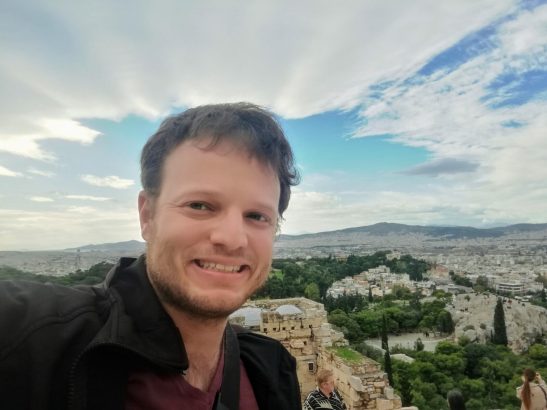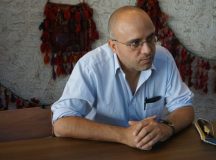Tal Kra-Oz is a writer based in Tel Aviv.
Previous contributors to this series have done an excellent job at covering all the bases, and included a great deal of songs that — depending on the time of day, the weather, etc. — I might consider favourites of my own. I haven’t included them. Creating a definitive list of favourite tracks is a futile exercise, anyway. Instead, this is a list of songs that haunt me, even the seemingly cheerful ones. They haunt me because of how they evoke lost pasts, and conjure up those potential futures that never came to fruition.
Many of the songs were popular when they were released, but probably aren’t as popular today. I hope you like them.
Sasha Argov was one of this country’s most prolific composers, responsible for melodies that fused the Russian folk songs of his youth with jazz, blues and showtunes, creating a uniquely Israeli hybrid. This song began as the wordless central theme of He Walked Through the Fields, the film adaptation of Moshe Shamir’s novel. Though ostensibly the story of a heroic young kibbutznik fighting for his country’s independence, Argov’s music teased out the malaise lurking just out of sight.
The best-known version of the tune is by the folk duo The Parvarim. The words by lyricist Yoram Taharlev take Argov’s bittersweetness and tinge it with nostalgia for a childhood spent at Kibbutz Yagur, on the slopes of Mount Carmel. And while The Parvarim’s vocal perfection and Latin American strumming make their version my favourite, I’d be amiss not to mention one more, by David Lavi and Tamar Philosof, two singers who grew up in observant households. Released just as Israel was emerging from its first COVID-19 lockdown, it seamlessly blends Argov and Taharlev with Luley Toratcha, a niggun (wordless melody) by Shlomo Carlebach. Attempts to harmonise religious and secular often fail miserably, but at least for four minutes and 20 seconds, this one works like a charm.
Meir Ariel could have just celebrated his 80th birthday, fêted as Israel’s greatest troubadour. Instead, he died in 1999, controversial and without many fans, following an errant tick bite. His music went on to achieve a radical reappraisal. The singer-songwriter, who often had trouble filling a pub for one of his gigs, would have been amused to see the crowds thronging amphitheaters for one of the annual tribute concerts held in his memory.
I’d like to think that had I been just a few years older, I would have been one of the select few at a Meir Ariel gig. Instead, I became a fan when most everyone else did, when I was on the cusp of military service. This song is about Ariel’s reserve duty during the 1973 Yom Kippur War, which is when he originally wrote it. By the time the song made its way to his second record, in 1984, he had served in the First Lebanon War as well, and he added lyrics alluding to it. And though my own IDF service was very different from Ariel’s, there is no one better at conjuring the boredom of a long, mercifully quiet night of guard duty, comforted by a good book (in this case, Hemingway’s Islands in the Stream, translated by Aharon Amir). Maybe this is the song Dylan would have written had he been born in Kibbutz Mishmarot, rather than Duluth, MN.
Another singer-songwriter who proudly wears his Dylan influences on his sleeve is Shlomi Shaban. The child piano prodigy broke bad and achieved early success with a pop album that was edgy, hilarious, and probably too clever by half. Though he still can’t resist the odd wisecrack, his offerings since then have been more soulful.
This song, a duet with the supreme folk singer Chava Alberstein, was released in early 2014, but seems as if it was written as a soundtrack to the long and terrible summer of that year, the summer of Operation Protective Edge. The lyrics are cryptic, full of vanilla skies and sooty horizons, trenches and turrets. But as the spectral music video makes chillingly clear, Shaban’s subject is a history of violence, at once national and deeply personal.
I could have chosen pretty much any song by Berry Sakharof. He’s too much of a mensch to be a proper rock star, but he’s the closest thing we’ve got. Rock music barely exists here anymore, at least not in the mainstream, but Sakharof is still going strong. And his interest in the so-called ‘Jewish bookshelf’ — prayers, piyyutim (liturgical poems), and so forth — both helped define that ‘trend’ in 21st-century Israeli music and undermined it, because Sakharof has remained an icon of secular Tel Aviv throughout.
Ribono Shel Olam was written by Beeri Hazak, an economist and gifted poet who was killed in the Yom Kippur War, when he was only 31. It’s a hellishly beautiful mélange of military lingo and prayerbook Hebrew, clearly written by a man on death’s doorstep, as so many young men were at that time. If you’ve watched the television show Valley of Tears through to the end, you’ve heard this one, with the bleating shofar, and Sakharof’s rugged voice raging through a broken walkie talkie.
The first time I saw Shai Tsabari he was Berry Sakharof’s MC, countering the latter’s somewhat staid stage presence with an infectious lust for life, and making sure that every single audience member was on their feet. Tsabari then set out on a solo career, deploying his generous, mellifluous voice in some of the most uplifting concerts I’ve had the pleasure of attending.
Tsabari’s style defies neat categorisation. When I profiled him a few years back, he took pride in that, and told me ‘in the heaven of songs they ask the songs that ascend whether they were good or bad. And I love good music, I don’t care about genre.’ This song, with lyrics by Chani Arbel and music by Ahuva Ozeri, is one that the late, great Ozeri would have performed herself had she not lost her vocal chords to laryngeal cancer (she played the bulbul tarang on this recording). Tsabari made the song his own.
If Sasha Argov is the soundtrack of the state’s infancy, Yair Rosenblum composed the tunes for its rowdy young adulthood. Mainstream Israeli culture was still deeply patriotic: IDF entertainment troupes, comprised of talented men and women doing their compulsory military service, ruled the airwaves. But even when they were quite literally singing the praises of a secret elite unit, the music Rosenblum wrote was more Beatles than pomp and circumstance. And frequently that style seeped into the substance, as in Shir Lashalom, the Nahal Band’s 1969 anti-war anthem, a homegrown Let the Sunshine In.
Natan Alterman, the great lyric poet, wrote both lyrics and poetry, but he didn’t intend for Leil Hanaya, one of his many masterpieces, to be set to music. The words — dense, and rich with biblical allusion — are about his experiences as a somewhat hapless soldier in the Negev battles of the War of Independence, but also about the art of poetry. Alterman’s mixed feelings about his status as a celebrated Zionist poet witnessing the horrors of war firsthand are very much present.
Three years after Alterman’s death and months before the Yom Kippur War, Rosenblum composed music for the poem, shortening it in the process. He gave it to Hanan Yovel, Efraim Shamir, and Yardena Arazi, three recent veterans of the Nahal Band, to perform at the annual Israel Song Festival. The words are virtually untranslatable (many contemporary Hebrew speakers will probably find them puzzling as well), but the song — a sui generis prog rock specimen — is a blast.
Several contributors to this series have already extolled the virtues of Arik Einstein, the deeply beloved singer, and there is little I can add. This love song is a personal favourite of mine. And it’s more evidence that Israeli rock stars have always turned to ancient texts for inspiration; the song is made up almost entirely of quotes from the Song of Songs, the original anthology of Hebrew erotica. Einstein joyfully sings this one in a faux-Yemenite dialect, something very few people could have gotten away with, even in 1971 when the song was released.
This is an odd and special song, sung in large part by the cantor of the band’s local synagogue in Talmei Eliyahu, a moshav in the Negev. It veers violently between the divine and the sacrilegious even as it closely echoes the rhythms of Yom Kippur’s Seder Avodah (service of the High Priest). To be honest, you should just listen to the whole album, Menoim Kadima. Listening to it today, this 2005 release sounds like a great big farewell party: to the pride of place given to Israeli rock in the ‘80s and ‘90s, now relegated to the third or fourth tier of the music scene; to Gabriel Balachsan, one of the band’s two front men, who died tragically in 2013; to the idea of the album as a physical object containing a series of songs meant to be listened to in sequence, rather than a random collection of Spotify hits; and to the band itself, that broke up soon after the album was released. It’s a fine examples of rock music that could not have been made anywhere else.
Rona Kenan is one of the most charming musical talents to come of age in the ‘90s, and one of the most committed to continuing the work of her forebears. Not least, one suspects, because she is the daughter of Amos Kenan, who was himself a gifted lyricist (and also a novelist, painter, activist, and sculptor, among his many pursuits).
This is the penultimate track on her song cycle Shirim Le’Yoel (Songs for Yoel). The protagonist, Yoel, has a biography almost identical to that of Amos Kenan, and this song is about the twilight of their lives, plagued by Alzheimer’s and a deep yearning for an indelible past that is all but forgotten. It closes with the opening verse of Hayalim Almonim (Unknown Soldiers), the anthem of Lehi, the pre-state underground militia of which the elder Kenan was a member.
My final selection is another song from the embarrassment of riches that was the 1973 Israel Song Festival, and another song with lyrics by Yoram Taharlev (the music is by Benny Nagari). Performed by the always delightful Gidi Gov, it’s essentially a series of biblical riddles, with each verse hinting at the identity of an unnamed Old Testament character (the name of the song is a sly reference to a festive prayer). I promise it doesn’t feel like homework. Taharlev died a few months ago, and his puckishness, his disregard for genre or boundaries of subject matter, and his all-around brilliance, are sorely missed.





































